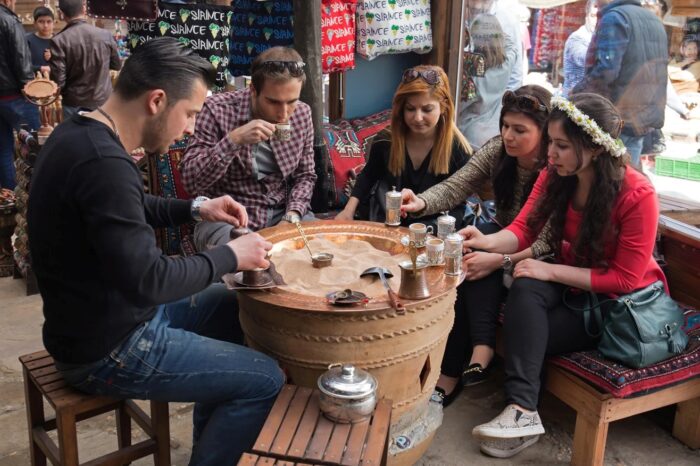Turkish coffee is not simply a drink. It is a ritual, a social bond, and a cultural heritage that dates back nearly five centuries. Recognized by UNESCO on its Intangible Cultural Heritage of Humanity list, the Ottoman tradition of preparing coffee in a cezve has become a symbol of identity for generations in Turkey and beyond.
Yemen'den Osmanlı İmparatorluğu'na
CNN'in haberine göre, hikâye 15. yüzyılda Yemen'de, Sufi mistiklerin uzun ibadet gecelerinde uyanık kalmak için kahve tüketmesiyle başlıyor. Kanuni Sultan Süleyman'ın 1538'de Yemen'i ilhak etmesiyle kahve Osmanlı İmparatorluğu'na girdi ve kısa sürede İstanbul'a ulaştı. 1550'lerde şehir, hızla kültürel ve siyasi hayatın merkezi haline gelen ilk kahvehanelerin yükselişine tanık oldu.
Bakır bir cezvede yavaşça hazırlanan Türk kahvesi, çoğu demleme yönteminden farklıdır: suda "pişirilerek" sert, filtresiz ve köpüklü bir içecek elde edilir. Kahvehaneler hızla yayıldı ancak çoğu zaman muhalefeti teşvik ettiklerinden korkan yöneticilerin şüphesini çekti. Benzer endişeler daha sonra İngiltere'de de ortaya çıkmış, Kral Charles II 17. yüzyılda Londra'daki kahvehaneleri kapatmaya çalışmış ancak başarısız olmuştur.
A Ritual of Hospitality
CNN highlights that in Turkey, coffee represents community. Guests are traditionally offered coffee with water and lokum (Turkish delight). The drink is consumed slowly, giving grounds time to settle — setting the stage for the playful ritual of coffee-cup reading, where the shapes left behind are interpreted for fun as signs of fortune, journeys, or good news.
Turkish coffee even plays a role in marriage traditions: during courtship, a bride-to-be serves coffee to the groom’s family. As a test, she may add salt instead of sugar to his cup, with his reaction taken as a measure of patience and maturity.
From Istanbul to London and Beyond
The influence of Turkish coffee extended far beyond the empire. CNN recounts how in 1652, London’s first coffeehouse opened in St. Michael’s Alley, introduced by a merchant from İzmir and his servant Pasqua Rosée. For a penny, patrons could drink freely while debating news and politics in what became known as “penny universities.”
Despite this reach, Turkish coffee never achieved the global recognition of espresso. Some scholars, CNN notes, believe this is due to generational shifts: for many young people in Turkey, it has become a drink associated with parents rather than innovation.
Tradition and Modern Revival
Others argue that innovation is vital. Turkish coffee ambassadors are working worldwide to showcase the ritual. In London, workshops teach traditional preparation, while in New York, the “Turkish Coffee Room” blends performance, storytelling, and tasseography to captivate new audiences.
Back home in Istanbul, authentic experiences remain easy to find. CNN recommends iconic spots such as Hafız Mustafa, Mandabatmaz on İstiklal Street, and Nuri Toplar in the Egyptian Bazaar. For a modern twist, Hacı Bekir in Kadıköy offers creative interpretations.
A Living Heritage
As CNN concludes, Turkish coffee endures as a living cultural symbol — one that connects history with hospitality, ritual with storytelling. Whether served in a historic Istanbul café, a family home in Safranbolu, or a workshop abroad, every cup carries with it a taste of heritage and a story waiting to be told.
This article is adapted from a feature originally published by CNN Travel. All rights remain with the original publisher. Qahwa World republishes it here for educational and cultural purposes.
The post Türkiye'de Kahve Bir İçecekten Daha Fazlası - Kültürel Bir Ritüel appeared first on Qahwa World.




